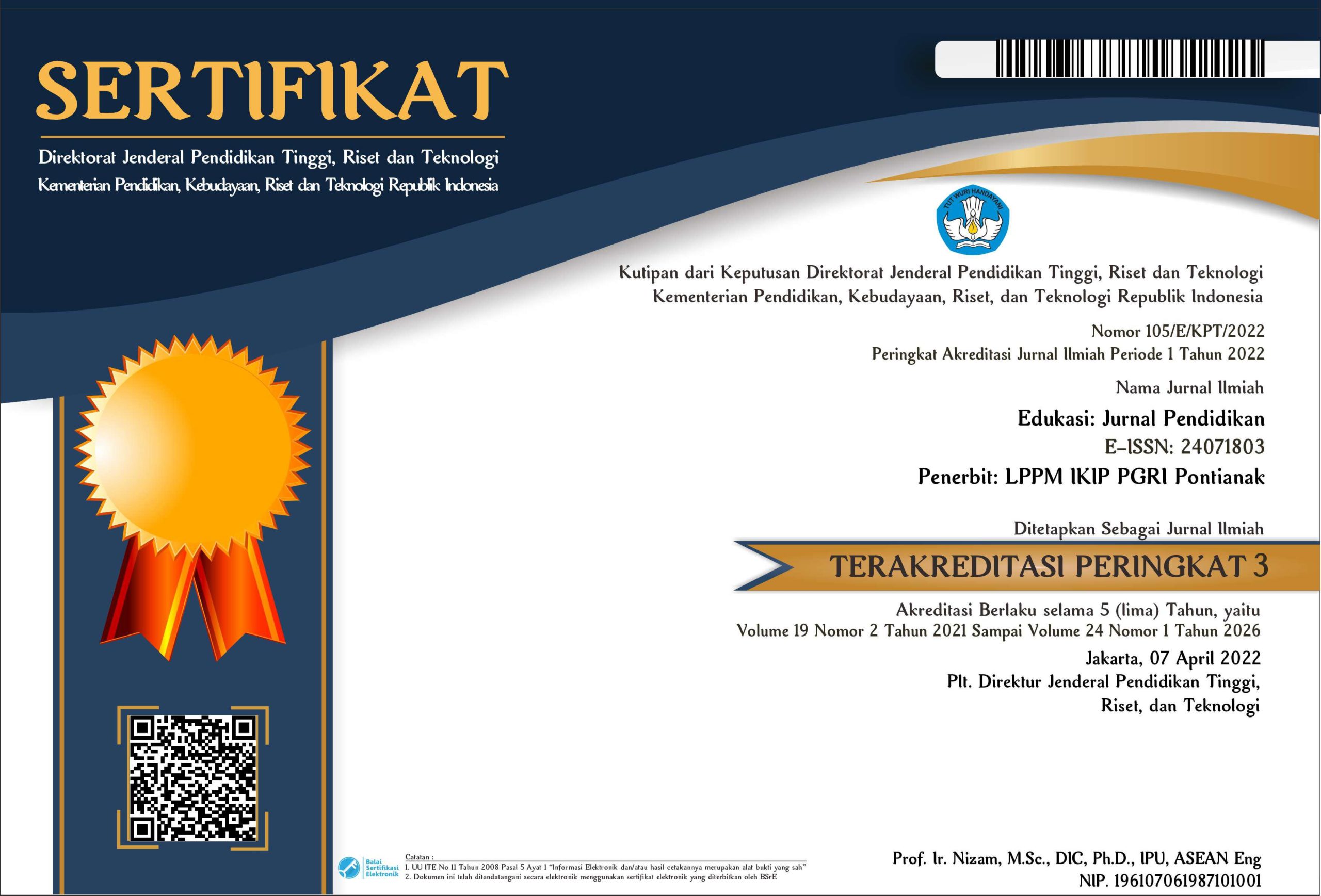Evaluasi Pembelajaran Online Berbasis Moodle pada Mata Kuliah Sistem Operasi
DOI:
https://doi.org/10.31571/edukasi.v18i1.1653Keywords:
evaluasi, pembelajaran online, MoodleAbstract
Abstrak
Tujuan penelitian adalah untuk mengetahui evaluasi pembelajaran online berbasis Moodle pada mata kuliah Sistem Operasi dari aspek: (1) Kemampuan mahasiswa memakai Moodle; (2) Kemampuan dosen memakai Moodle; dan (3) Keaktifan komunikasi mahasiswa dan dosen dalam penggunaan Moodle pada mata kuliah Sistem Operasi. Metode penelitian yaitu deskriptif. Subjek penelitian adalah mahasiswa dan dosen yang terkait dengan mata kuliah Sistem Operasi. Teknik pengumpulan data menggunakan: (1) Angket, untuk memperoleh informasi dari mahasiswa; (2) Dokumentasi, yaitu menganbil data log pada Moodle; dan (3) Wawancara, untuk memperoleh data dari dosen pengampu berkaitan dengan kemampuan dan aktivitas. Teknik analisis data menggunakan analisis deskriptif. Hasil penelitian menunjukkan bahwa: (1) Mahasiswa mampu menggunakan fitur seperti mengunduh materi, mengunggah tugas, quiz secara online; (2) Dosen sudah mampu menggunakan fitur dasar Moodle; dan (3) keaktifan mahasiswa dan dosen masih kurang karena belum optimal menggunakan komunikasi melalui fitur forum dan chatting yang ada di Moodle.
Â
Abstract
The purpose of this research was to determine the evaluation of Moodle-based online learning in the Operating Systems course in aspects of: (1) The ability of students to use Moodle; (2) The ability of lecturers to use Moodle; and (3) The activeness of student and lecturer communication in the use of Moodle in the Operating Systems course. The research method was descriptive. Research subjects were students and lecturers related to the Operating Systems course. Data collection techniques used: (1) Questionnaire, to obtain information from students; (2) Documentation, which is to take log data on Moodle; and (3) Interviews, to obtain data from supporting lecturers related to abilities and activities. Data analysis techniques used descriptive analysis. The results showed that: (1) Students were able to use features such as downloading material, uploading assignments, quizzes online; (2) Lecturers have been able to use the basic features of Moodle; and (3) the activeness of students and lecturers is still lacking because it is not yet optimal in using communication through the forum and chat features available in Moodle.
Downloads
References
Al-Ajlan, A. S. 2012. A Comparative Study Between E-Learning Features, Methodologies, Tools and New Developments for E-Learning, Elvis Pontes,
Anderson Silva, Adilson Guelfi and Sergio Takeo Kofuji. Rijeka: IntechOpen.
Asiri, M. J. S., Rosnaini, M., Bakar, K. A., & Ayub, A. F. M. 2012. Factor Influencing the Use Learning Management System in Saudi Arabian Higher Education: Theoritical Framework. Journal Higher Education Studies, 2(2): 125-137.
Asrul. 2014. Evaluasi Pembelajaran. Medan: Citapustaka Media.
Cavus, N. & Zabadi, T. 2014. A Comparative of Open Source Learning Management Systems. Journal of Procedia–Social and Behavioral Science, 143(2014): 521–526.
Chourishi, D., Butta, C. K., Churasia, A., & Soni, A. 2012. Effective E-Learning through Moodle. International Journal of Advance Technology & Engineering Research, 1(1): 34-38.
Codd, A. M. & Choudhury, B. 2011. Virtual Reality Anatomy: Is It Comparable with Traditional Methods in the Teaching of Human Forearm Muscoloskeletal Anatomy? Anatomical Sciences Education, 4(3): 199-125.
Horvat, A., Dobrota, M., Krsmanovic, M., & Cudanov, M. 2015. Student Perception of Moodle Learning Management System: A Satisfaction and Significance. Interactive Learning Environments, 23(4): 515-527.
Hsiao-hui, H. & Yu-ying, C. 2013. Extended TAM Model: Impacts of Convenience on Acceptance and Use of Moodle. Journal of US-China Education Review A, 3(4): 211-218.
Indrakusuma, H. A. & Putri, A. R. 2016. E-Learning 1: Teori dan Desain. Medan: Tulung Agung.
Inzunza, B., Rocha, R., Márquez, C., & Duk, M. 2014. Asignatura Virtual Como Herramienta de Apoyo En La Enseñanza Universitaria de Ciencias Básicas: Implementación y Satisfacción de Los Estudiantes. Formación Universitaria, 5(4): 3-14.
Jenaro, C., MartÃn, M. E., Castaño, R., & Flores, N. 2018. Rendimiento Académico en Educacion Superior y Su Asociación Con la Participación Activa En la Plataforma Moodle. Studios Sobre Educación, 34(8): 177-198.
Kerimbayev, N., Kultan, J., Abdykarimova, S., & Akramova, A. 2017. LMS Moodle: Distance International Education in Cooperation of Higher Education Institutions of Different Countries. Journal of Education and Information Technology, 22(5): 2125-2139.
Maryani, Y. 2013. Aplikasi E-Learning Sebagai Model Pembelajaran Berbasis Teknologi Informasi di Jurusan Kesehatan Gigi Poltekkes Kemenkes Pontianak. Vokasi, 9(1): 27-39.
Ndlovu, M. C. & Mostert, I. 2017. Teacher Perception of Moodle and Throughput in a Blended Learning Programme for In-Service Secondary School Mathematics Teacher. Africa Education Review, 15(2): 131-151.
Prawiradilaga, D. S., Ariani, D., & Handoko, H . 2013. Mozaik Teknologi Pendidikan: E-Learning. Jakarta: Kencana.
Sachan, K. & Singh, R. 2015. A Survey and Comparative Analysis of E-Learning Platform (Moodle and Blackboard). International Journal of Recearch in Mathematics Computer Science and Information Technology, 2(1): 293-299.
Schoonenboom, J. 2014. Using an Adapted, Task-Level Technology Acceptance Model to Explain Why Instructors in Higher Education Intend to Use Some Learning Management System Tools More Than Others. Computers & Education, 71(14): 247-256.
Subramanian, P., Zainuddin, N., Alatawi, S., Javabdeh, T., & Hussin, A. R. C. 2014. A Study of Comparison between Moodle and Blackboard on Case Studies for Better LMS. Journal of Information System Research an Innovation, 6(4): 26-33.
Supangat, A. 2007. Statistik dalam Kajian Dekskriptif Nonparameterik, Inparsial, dan Parameterik. Bandung: Alfabeta.
Surjono, H. D. 2010. Membangun Course e-Learning Berbasis Moodle. Yogyakarta: UNY Press.
Tambunan, L. 2018. Efectiveness of Problem Based Learning Models by Using E- Learning and Learning Motivation Toward Students Learning Outcomes on Subject Circullation Systems. Indonesian Journal of Science and Education, 2(1): 96-104.
Downloads
Published
How to Cite
Issue
Section
License
Authors who publish in this journal agree to the following terms:
- Authors retain copyright and grant the journal the right of first publication with the work simultaneously licensed under a Creative Commons Attribution License (CC-BY-NC) that allows others to share the work with an acknowledgment of the work's authorship and initial publication in this journal.
- Authors are able to enter into separate, additional contractual arrangements for the non-exclusive distribution of the journal's published version of the work (e.g., post it to an institutional repository or publish it in a book), with an acknowledgment of its initial publication in this journal.
- Authors are permitted and encouraged to post their work online (e.g., in institutional repositories or on their website) prior to and during the submission process, as it can lead to productive exchanges, as well as earlier and greater citation of published work.

 Download: 508
Download: 508


















